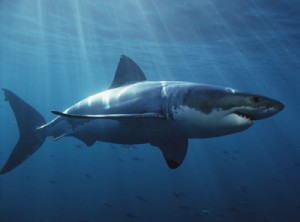
California Department of Fish and Game News Release
Sept. 15, 2010
The Department of Fish and Game (DFG) reported collecting a record number of shark-bitten sea otters in August 2010 along California’s central coast. Scientists collected 19 injured or dead otters with signs of shark bites in August and seven already in September. The majority of the otters were collected in the Morro Bay-Pismo Beach area. The 10-year average for August is 7, and for September is 6.
Scientists believe this increase in shark-bitten otters in California may be due to cooler than average ocean temperatures from an unusually mild summer, creating an ideal condition for white sharks.
“White sharks do not typically feed on sea otters,” explained Michael Harris, environmental scientist with DFG’s Office of Spill Prevention and Response (OSPR). Harris has been working with sea otters for 19 years. “Their preferred prey is seals and sea lions. This would explain why the majority of the otters collected have a single bite mark. These bites are more investigative – like a taste test.”
White sharks occur around the world, mostly in cold, temperate seas with a surface temperature of 50 to 72 degrees Fahrenheit. As top-level predators, sharks serve the marine environment by helping keep seal and sea lion populations in check. As white sharks grow, they transition from feeding on fish as juveniles to feeding on marine mammals with high blubber content like seals and sea lions.
“Without much data on the white shark population off California, we can only speculate as to the cause for the increase in the otter bites,” said Harris. “But perhaps there are more juvenile sharks in the area, testing various prey items as they transition.”
Sightings of white sharks by humans may have also increased this year based on anecdotal information provided on a number of websites. Unfortunately no population estimates exist for white sharks.
Although white sharks are not listed as a threatened or endangered species under the Endangered Species Act, California regulations prohibit the take of white sharks under a sportfishing license and the commercial fisheries are prohibited from targeting the species.
For more on white sharks, please visit: www.dfg.ca.gov/marine/pdfs/sharkfacts.pdf
